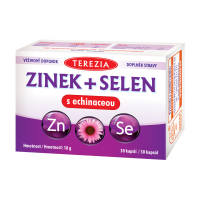Nutritional supplements / Immune system
Vitamin D3 1,000 IU normal immune system function
- Price: 13,99 € incl. VAT plus Delivery Product number.: E2157 Delivery 2-3 days
-
What is vitamin D?Strictly speaking, vitamin D is not a vitamin, but a prohormone. It is therefore not a vitamin because, according to the historical definition of vitamins, they have to be taken in with food and cannot be produced in the body. Since vitamin D was discovered after vitamins A, B and C, it consequently contained the letter D. Vitamin D is converted in the body by synthesis from 7-dehydrocholesterol. This requires sufficient dehydrocholesterol in the body and sun exposure - the UVB portion - of the skin. Animals also need vitamin D. Vertebrates usually get enough vitamin D from the sun. People mostly take in too little vitamin D because they are mostly in houses and protect them from the sun when the sun shines. However, direct sunlight is essential for the photochemical reaction in the body that produces vitamin D3. Only about 5 to 20 percent are absorbed from food.Diseases in which vitamin D plays a roleSomewhat contradicting, doctors and nutritionists are discussing the influence of vitamin D on other diseases. The above-mentioned osteomalacia in adults and rickets in young children and infants are clearly related to vitamin D deficiency. A connection with calciol deficiency and the following diseases also seems to be relatively certain: Firstly with fibromyalgia as well as muscle weakness and pain. Also for respiratory infections and tuberculosis and periodontitis in pregnant women. It is still being discussed whether subsequent diseases (with inflammatory processes) lead to a vitamin D deficiency or whether this only promotes the development of the disease.The discussion includes:* Allergies*Asthma* Autoimmune diseases*Dementia* Parkinson's disease* Heart attack and heart attack risk* Brain performance disorder* Infections* Cardiovascular diseases* Cancer*Metabolic syndrome* Osteopenia and osteoporosis*Sleep disordersFood supplement based on vitamin D3 (cholecalciferol) with 25 µg (1,000 IU) per capsule. Contents: 60 capsulesHealthy statements (EU Regulation No. 432/2012): Vitamin D contributes to the absorption and normal use of calcium and phosphorus; to maintain normal calcium levels in the blood; to maintain the bones and teeth under normal conditions; normal muscle function and normal immune system function.Ingredients: filler (microcrystalline cellulose), cholecalciferol (vitamin D3), anti-caking agent (vegetable magnesium stearate and silicon dioxide), vegetable capsule (coating agent: hydroxypropylmethylcellulose; humectant: purified water).Nutritional information:1 cap (341 mg)Vitamin D3 (cholecalciferol) (1,000 IU)25 μg (500% *)* VRN: nutrient reference value in%.WarningsNoRecommended dosageAs a dietary supplement, it is recommended to take 1 capsule a day.
Tuno Canarias

Follow us on facebook

Fairvital
News
05.03.2024 - Ukrainer drohen dem Westen mit Terrorfeldzugmore......
13.01.2024 - Neuer Ärger zum Haushalt: Griff nach der Arbeitslosenversicherung rechtswidrig?
more......
01.05.2023 - Den Krebs besiegen … aber Natürlich !!
more......





